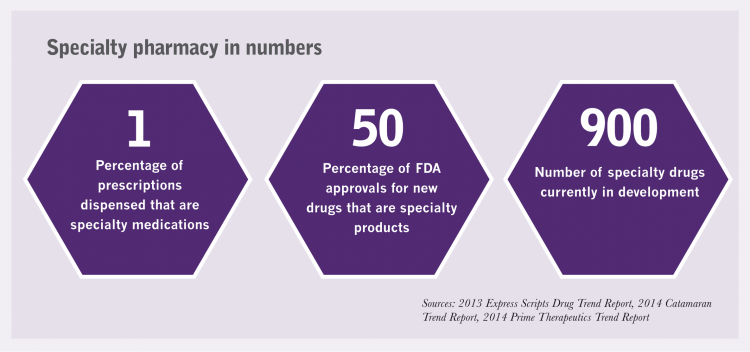Specialty patients are already in your community. Isn’t it time to start providing their care?
PBMs, pharmaceutical manufacturers, health plans and specialty pharmacies are all starting to focus on specialty care.
It’s easy to see why. The specialty market is booming. Specialty is the fastest-growing segment of the pharmacy industry. More than 40 percent of the drugs currently under development are specialty drugs, according to the National Center for Policy Analysis.
They’re also some of the most expensive. Specialty medications make up less than 1 percent of prescriptions dispensed, but account for 27.7 percent of total pharmacy spending in the U.S., according to the 2013 Express Scripts Drug Trend Report.
So far few independent pharmacies have entered into this niche area, but the time to do so is now. Market dynamics are all pointing to specialty pharmacy as a profit driver for independents.
“The increasing pressures of low profitability on generics and patent expirations on brand drugs, coupled with the pipeline of FDA approvals heavily-focused on specialty, means independents must focus on generating revenues in more ways than just filling prescriptions,” said Rinku A. Patel, Pharm.D., R.Ph., founder and CEO of KloudScript, Inc., a company that provides a turnkey specialty solution for independent pharmacies. “This is the time for independents to innovate, adapt or become extinct.”
Competition for servicing specialty patients is only increasing. Mandatory mail order has already started to steer patients taking specialty medications away from retail pharmacies, according to the 2014 NCPA Digest. “Competition is fierce as everyone runs to get a piece of the pie,” Patel said. “But my firm belief is that the provider with the best quality of care and the most efficient service model will have great opportunities to participate.”
“It’s important for independents to start building experience in the specialty space now,” she said. “The pharmacy industry is evolving and independents need to provide specialty care services before becoming completely excluded from this space.”
Simplifying care
Health care is one area where consumers tend to rely on the resources within their community. They seek care from their local providers and pharmacists when they’re ill. As specialty pharmacy grows, it’s important to make specialty care local.
“Three or four years ago, specialty at retail was not a viable service model in the eyes of industry stakeholders,” Patel said. “But look at what we have today. Larger chains are seeing the value of specialty at retail and even some payers are recognizing the need to simplify care and improve access for specialty patients.”
And who better to provide care for the specialty patients in their communities than independent pharmacists?
Specialty patients are dealing with not only the physical, but also the emotional issues that result from their conditions. Patients with chronic conditions like cancer, Crohn’s disease, Hepatitis C, HIV/AIDs, multiple sclerosis, psoriasis, rheumatoid arthritis and osteoporosis can benefit from the personalized attention of their local pharmacy.
“When specialty pharmacies first emerged, the goal was to have a close-knit patient- pharmacist relationship to result in better support and clinical care for the patient,” Patel said. “As the specialty boom has taken over, unfortunately, most specialty pharmacies have adopted the mail order model where that close-knit relationship isn’t feasible. This is where independent pharmacies can make the biggest difference.”
The independent community pharmacies that have started providing specialty services have already improved patients’ lives.
“Every day I hear stories about the impact our pharmacy providers have on patients and caregivers receiving specialty care,” Patel said. “Like how specialty care transformed the life of a young man covered in 80 percent psoriasis, or how the patient who was terrified of self-injection overcame her fears with the help of the face-to-face training provided by a pharmacist.”
“We have to help make the specialty experience special again for the patients who are experiencing these excruciating and life-altering chronic conditions,” she said.
Starting out
Specialty pharmacy is still a new area for many independent pharmacies, but it’s the field of the future.
“Twenty years ago no pharmacist working in a retail environment thought they would be administering immunizations and now those very individuals are delivering flu shots,” Patel said. “The question pharmacy owners need to ask themselves is, ‘If I don’t get into specialty today, what will the impact be on my business in three to five years?’”
Even though specialty drugs have lower profit margins due to their high cost, they have much higher dollar profitability compared to generics or non-specialty brand drugs—and they offer new ways to drive revenue.
“The challenge for independent pharmacies today is the need to diversify their businesses so that they’re not just relying on brand and generic prescriptions to generate revenue,” Patel said.
Specialty pharmacy does just that. Independent community pharmacies can grow revenue simply by taking care of all of their specialty patients’ prescription and health care-related needs in one place.
“Independents have started to provide a lot more clinical services over the past 10, 20, 30 years,” Patel said. “Immunizations, medication synchronization, MTM and consultations related to diabetes education, to name a few. These types of clinical services have been very valuable.”
The clinical services independent pharmacies are already providing can easily transition to improving care for specialty patients—and increasing business. Patients who have diseases that require specialty drugs may also need to get vaccinated to prevent complications, or they may need over-the-counter drugs to manage side effects. “This all leads to a diversification of revenue sources,” Patel said.
It’s also important to synchronize all of a patient’s specialty and non-specialty medications. “This is a competitive advantage for independents because many times patients are getting specialty medications from their specialty pharmacy and the rest of their medications locally. This is an opportunity to provide better care under one pharmacy,” Patel said.
Obstacles to expect
Independent pharmacies face many challenges when it comes to specialty pharmacy. The special handling of the drugs, the extensive patient care and the high costs involved all represent obstacles to success.
“Specialty pharmacy requires extensive infrastructure and operational demands that independents are not used to,” Patel said.
The first challenge is the investment. “One of the biggest challenges I see for independents is that they believe they can start doing specialty without much investment of resources,” Patel said. “Just like when they bought their pharmacy, there has to be an infusion of capital and resources. It requires time and money before they see a return-on-investment.”
In other words, pharmacies can’t expect to turn into a specialty pharmacy overnight. “Specialty operations are complex and require the integration of sales, marketing, and operational and clinical strategies,” Patel said.
You can’t look at specialty simply as a dispensing service for your pharmacy. “You have to walk, talk and act like a specialty care provider,” Patel said. “Many times I talk to owners and they look at specialty only from the lens of ‘dispensing specialty drugs.’ This can get them to fill a script or two for patients who accidentally walk into their pharmacies. However, it will not allow them to have a sustainable specialty care program that integrates well with the rest of their business and creates opportunities for growth long-term.”
Specialty pharmacy also requires additional knowledge and capabilities related to specialty services, such as helping patients find financial assistance for their costly medications. “The patient journey in the world of specialty is different,” Patel said. “There’s confusion over co-pays, prior authorizations, delays, lost shipments and more.”
“Pharmacy staff will have to help with issues like funding support,” Patel said. “It’s also important for the owner to understand the strategic aspects and critical success factors of the specialty business.”
Pharmacies looking to get into specialty will also need to work through issues like simply accessing the drugs their patients need. It’s not as simple as ordering traditional brand and generic pharmaceuticals.
“Specialty pharmacies have evolved over the years to develop services that cater to payers and pharma,” Patel said. “This leads to semi-exclusive networks of specialty pharmacies in a payer contract that prevent retailers from participating. There’s also the problem of retailers not being able to access the drugs they need because they’re tied down in a closed or limited channel.”
Competition is huge in specialty right now and independents will need to partner with a company that provides support for these strategic and administrative burdens in order to succeed, Patel said.

Building relationships
Because specialty patients need regular monitoring, pharmacies and physicians must work closely together to properly care for the patient.
“There’s a notion that prescribers don’t want to collaborate with pharmacists,” Patel said. “This may be true to some extent on non-specialty medications because the complexity of care isn’t high and the prescriber community may not require additional support from the pharmacists. However, when it comes to specialty, prescribers and pharmacists do collaborate on a regular basis to provide care for specialty patients.”
Many specialists even rely heavily on specialty pharmacists to assist with managing adherence and refill compliance, as well as educating and training patients on the administration of specialty medications.
“All of this is achieved if pharmacists take the time to build relationships with prescribers in their community,” Patel said.
Engaging with organizations in your community can also benefit your pharmacy when it comes to specialty. The support groups and organizations dedicated to the specialty disease states you service are good sources to know.
“Independents are already more community and patient-centric than other businesses,” Patel said. “By forming relationships with the support groups in the community, and doing direct-to-patient marketing of their specialty services, independents can build bridges that remotely-operating pharmacies can’t, at least with respect to the patient-pharmacist relationship.”
Taking the right steps
Creating a specialty program in your retail pharmacy requires a lot of work, and it’s important to know where to start.
To develop a specialty program, you need to first look at the disease states you want to target. “If you’re in an area where there’s a high concentration of geriatric patients, then it doesn’t make sense to introduce a therapeutic category that primarily affects young people,” Patel said.
“It would also make sense to start your specialty service integration initially with therapies that are primarily reimbursed under the pharmacy benefits,” she said. “It will take time and experience to come to a stage of being able to handle medical billing processes.”
Pharmacies also need to take into consideration the operational and clinical complexity of the drugs within the therapeutic category they choose to target.
“If all of the drugs in a given category of interest are infused products, then it doesn’t make sense to attempt that therapeutic category right out of the gate,” Patel said. “It also doesn’t make sense to select a category in which a greater percent of the products are only distributed through closed or limited distribution channels that you don’t have access to. It is critical to build experience and demonstrate your services by targeting therapeutic categories with the most success factors leaning towards you.”
It all comes down to doing research ahead of time to define how you can integrate specialty into your current business plan. “Choosing a few therapies of interest is a good start, but you also need to do financial and market analysis to determine a sales strategy,” Patel said. A sales strategy could be marketing to prescribers initially to let them know you offer specialty services, and then focusing on marketing to payers in later stages, for example.
As the specialty industry has grown, the challenges for specialty patients—and the retail pharmacies looking to serve them—have escalated, Patel said.
“A properly developed specialty care program with protocol that connects everything from sales and marketing to dispensing and clinical operations is essential for long-term success,” Patel said. “The mistakes I see independents make are either investing in the wrong resources or getting frustrated with road blocks and aborting their efforts altogether.”
A better experience
Retail pharmacies are where the patients are. Close patient-pharmacist proximity makes specialty care less confusing and more accessible. Empowering patients, so they’re able to choose the pharmacy where they receive their specialty drugs, is an important dynamic. Local care is the way of the future. “It has the ability to provide better pharmacoeconomic outcomes for not just patients but all of the stakeholders involved,” Patel said.
“Independent pharmacies must spend more time managing the patient and not just the prescription,” Patel said. “The retail pharmacy industry is moving toward becoming more patient-centric as opposed to just prescription-centric.”
“Imagine the difference you can make for specialty patients walking into your independent pharmacy,” Patel said. “Your pharmacists know them by first name, and probably even know their entire life stories. The passion independent pharmacies have for their patients is what can help redefine the specialty experience.”
About the expert
 Rinku A. Patel, Pharm.D., R.Ph., is the founder and CEO of KloudScript, Inc., a company that provides a turnkey solution for independent pharmacies to enter the specialty space. Dr. Patel is dedicated to enabling independently owned retail pharmacies to provide better care to patients using specialty medications.
Rinku A. Patel, Pharm.D., R.Ph., is the founder and CEO of KloudScript, Inc., a company that provides a turnkey solution for independent pharmacies to enter the specialty space. Dr. Patel is dedicated to enabling independently owned retail pharmacies to provide better care to patients using specialty medications.
She’s an expert in helping independent pharmacies succeed in specialty. She has worked in various roles in the field, including pharma relations and business development, specialty operations and clinical services development. But she’s most passionate about using technology to create solutions that tie business needs and clinical care into a meaningful resource for pharmacies, pharma and payers to ultimately improve care for patients.
(Learn more about KloudScript!)













